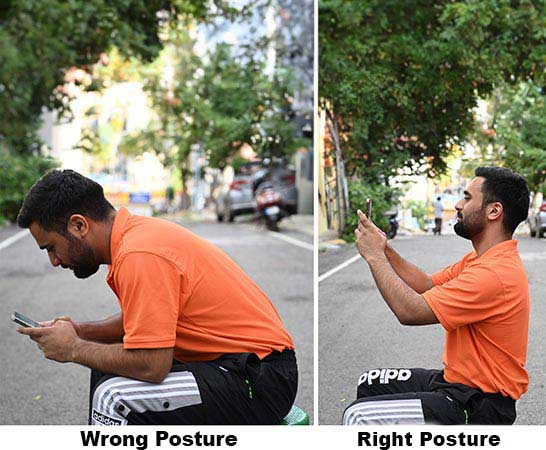
Improper shoulder posture significantly impacts one’s physical appearance and overall well-being. It affects almost everyone working on laptops and PCs to varying degrees. Rounded shoulders, characterized by the forward rounding or hunching of the shoulders and a slouched upper back, result from a combination of lifestyle factors, muscular imbalances and prolonged poor posture.
Understanding why you have rounded shoulders, along with the immediate and effective methods to correct or prevent this issue, is crucial to ensuring optimal musculoskeletal health.
What causes rounded shoulders?
Rounded shoulders occur when muscles in the upper back become weak, coupled with an overactivation of the muscles in the chest and the anterior (front) shoulder. The modern lifestyle, which involves prolonged periods of sitting, hunching over electronic devices and inadequate exercise, all contribute to this muscular imbalance.
“The basic problem is overuse or underuse,” says Dr Bharath Kumar B, sports medicine doctor as well as founder and medical director of Ziathlon sports medicine clinic, Bangalore. “If you look at a normal scapula, it is about 30 degrees to the transverse plane [an imaginary horizontal plane that divides the upper and lower halves of the body]. However, in case of rolled shoulders, the angulation increases to about 45 degrees or more.”
The scapula doesn’t have a bone attachment and is held to the rib cage by muscles. “The anterior muscles, such as the chest muscles, become tight and cause forward angulation of the scapula, also called protraction,” adds Dr Kumar. “At the same time, it also causes weakness of the scapular retractors [rhomboids] and the trapezius.”
As the chest muscles become tight and short and the upper back muscles become long and weak, the shoulders gradually become misaligned, leading to the characteristic ‘rounded’ appearance. This imbalance can affect the alignment of the spine, causing discomfort, pain and reduced range of motion.
How to fix rounded shoulders?
♦ Quick fixes
- Postural awareness: Being aware of proper posture (including that for the shoulders) and making a conscious effort to maintain it while performing daily activities will help fix or prevent the issue. “Stop flexing your neck and start extending it. Instead of looking down, start looking up and straight more frequently,” says Dr Kumar.
- Ergonomic adjustments: Ensure your workstation, chairs and devices are ergonomically designed to ensure better posture and reduced strain on the shoulders and upper back.
♦ Long-term fixes
- Stretching and mobility: Regularly stretching the chest and the front shoulder muscles can release the tightness and promote a more natural shoulder position. “One should restore their thoracic rotation, which can get limited due to rounded shoulders,” says Dr Kumar.
- Strengthening exercises: “People focus on pushing rather than pulling while exercising. They do bench presses [which involve pushing] rather than rows [which involve pulling]. This creates biomechanical imbalances where the front part of the body becomes tight, while the back becomes lengthened,” says Dr Kumar. Engaging in targeted exercises to strengthen the muscles of the upper back, such as rows, face pulls and scapular retractions, helps counteract the imbalance and improve posture.
Preventing rounded shoulders
♦ Quick fixes
- Take breaks: Take frequent breaks during sedentary activities (like working on laptops or PCs) and perform simple stretches to prevent prolonged periods of poor posture.
- Ensure proper screen time posture: Hold electronic devices at eye level and maintain an upright posture while using them to reduce strain on the shoulders and upper back. “The rampant use of mobile phones in a lazy boy position, where the neck is bent forward and the shoulders are relaxed, should be avoided,” says Dr Kumar.
- Ergonomic workspaces: Set up workstations and seating arrangements to encourage proper sitting posture, which puts little to no pressure on the shoulders or arms.
♦ Long-term fix
Exercise regularly: “Try to maintain a pull-to-push ratio of 3:2 in terms of volume and intensity, meaning pull three times and push two times. If you are pushing 20 kgs then you should be pulling 30 kgs with a focus on training your back,” says Dr Kumar. This strengthens the back muscles and can reduce the chances of rounded shoulders and other postural issues.
Takeaways
- Rounded shoulders, characterized by the forward rounding or hunching of the shoulders and a slouched upper back, can be caused by a combination of lifestyle factors, muscular imbalances and prolonged poor posture. It can significantly impact your physical appearance, how people perceive you and your overall well-being.
- Postural awareness, ergonomic adjustments, stretching and mobility as well as strength training can help fix rounded shoulders.
- To prevent the condition, work out regularly with exercises that focus on pulling. In addition, take frequent breaks while engaged in sedentary activities and arrange your devices and workstation ergonomically.

















